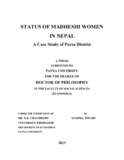Please use this identifier to cite or link to this item:
http://archive.nnl.gov.np:8080/handle/123456789/190| Title: | Status of Madheshi Women in Nepal : A Case Study of Parsa District |
| Authors: | Tiwari, Sushma |
| Keywords: | Economics Madheshi women |
| Issue Date: | 26-Mar-2019 |
| Abstract: | In developing countries like Nepal, women have always been discriminated and have suffered silently and are still suffering in silence. Self- sacrifice and Self-denial are the common features of these women; yet they have been subjected to all inequalities, indignities, inequalities, and discrimination. In every decision they have to ask either their husband or their family members, otherwise they have to face many torture and troubles. This is more common in Terai region where majority of women have no autonomy rights, and no decision making rights even within the household and also outside of the household. This has resulted poor status in the family and the nation. It is felt that various measures can encourage women’s participation in decision making. The measures themselves included implementing existing national and international commitments, raising awareness of the overall benefits of women’s empowerment, improved education, economic empowerment and increased advocacy for women’s rights and strict legal against dowry, child marriage, and violence against women. These measures together with more women friendly policies and programs of political parties and the civil societies would increase Nepalese women involvement in decision making inside and outside of the household. Women have always constituted about half of the population and the fact that a society cannot advance without their moving forward along with men has been recognized from the beginning of planned development. Nevertheless, initially women were viewed as a welfare issue as all human development issue was. Expenditure on education and health and other social items was categorized as welfare expenditure as was the expenditure on improving women's access to such services. This was the first phase of attention to women's needs. They were viewed just as consumers and mothers and wives. Their well being and education was considered necessary primarily because they were mothers and companions to men. All this started to change since 1975, when women were declared as an issue in development, the Women in Development (WID) approach. Their direct role in the production and hence in development started to be recognized. Women started to be seen as producers. But still they were viewed as a group left behind by the capitalistic production system, somehow outside the system. It seemed to assume that pulling them along while keeping the patriarchal structures and ideology intact, will change their status. Women's involvement at the decision making level both inside and outside of the house has been seen as necessary for success of development projects .All these concepts emphasized the women's position in relation to development and not her overall position in the society. In-spite of much rhetoric during the two decades following 1975, the changes realized in women's status and rights, particularly in developing countries, was marginal. After a review of the progress made in advancing women's cause, the Beijing Platform for Action (1995) proposed a 12 point program. The distinguishing feature of this Platform as compared to earlier programs was its emphasis on the multi-dimensional nature of women's subordination and the need to attack it in all spheres by mainstreaming and empowerment of women. It adopted a gender framework for an analysis and solution to women's problems. |
| Description: | PATNA UNIVERSITY FOR THE DEGREE OF DOCTOR OF PHILOSOPHY IN THE FACULTY OF SOCIAL SCIENCES (ECONOMICS) |
| URI: | http://103.69.125.248:8080/xmlui/handle/123456789/190 |
| Appears in Collections: | 300 Social sciences |
Files in This Item:
| File | Description | Size | Format | |
|---|---|---|---|---|
| Phd Thesis on Status of Madhesi Women in Nepal By Sushma Tiwari.pdf | 1.84 MB | Adobe PDF |  View/Open |
Items in DSpace are protected by copyright, with all rights reserved, unless otherwise indicated.